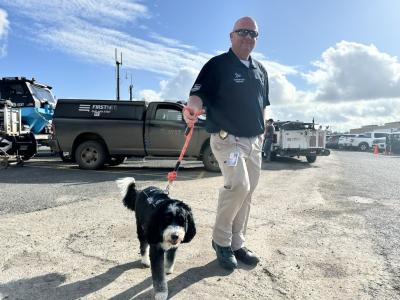When flash floods hit several communities across central Texas, a web of groups — from first responders to network recovery teams — sprang into action to stabilize the situation.
One of the crews on the ground was FirstNet’s Response Operations Group (ROG), a team led by former first responders overseeing deployment of public safety networks — bringing portable units like Compact Rapid Deployables (CRDs) and SatCOLTs to restore connectivity for first responders and impacted communities. ROG has been deployed to support recent disasters like Hurricane Helene, the LA wildfires and, most recently, the floods in Texas.
But whether it was the communities impacted or the teams of people helping them stay safe and connected, one unexpected support was ROG the Dog — FirstNet’s canine therapy program, bringing trained pups to offer comfort in the middle of the crisis.
Rich Johnson, FirstNet ROG Section Chief, said the teams are efficient and effective, many trained to work in high-intensity environments. "But we're not robots. We're still humans, just like everyone else in the world," he told Broadband Nation.
The ROG the Dog program currently has over 30 trained labradoodles across the country supporting people like Johnson who are deployed during crises.

Chief, a 4-year-old bernedoodle (see photo at right), was on the scene providing emotional support to hundreds of first responders in the field and community members at the Emergency Operations Center (EOC) in Kerrville, Texas, along the Guadalupe River.
"It's really neat watching Chief do his thing,” said Johnson. “And yes, I will admit it, I probably was on the ground playing with Chief for a bit, you know, privately. Because we all love dogs, and these dogs are absolutely amazing.”
Johnson described one scene where Chief found a distressed woman out in the field where the ROG team was working with impacted community members. He sat at her feet and leaned against her, and she looked down at him. “It was quite moving to see that he knew someone needed, quite frankly, a doggy hug, and that's really what ROG the Dog does for us," he reflected.
Trade skills in times of crisis
Johnson, retired from a career in law enforcement, still found himself with “a lot of fuel in the tank” and in interest in serving public safety. FirstNet felt like a natural continuation of that work in a unique and new way.
"It's absolutely amazing to watch, not just our technological response, but our actual first responder and community support," he detailed. "It's absolutely honoring and amazing to watch this occur, and most importantly, honoring to be part of this."
And it’s not only people on designated ROG and Natural Disaster Recovery (NDR) teams that travel to help in these situations. “During time of major disaster, major response: it takes hundreds," said Johnson, and members from various parts of the company volunteer to come help out.
"Your day job with AT&T may be in finance or HR or sales, whatever the groups might be. But you've gone through this additional training and readiness and exercise,” he continued. “So, when the unfortunate hits, we can scale however big we need to scale by augmenting with staff from outside of ROG and NDR.”
For field technicians, their daily work already services communities — helping them stay connected to jobs, education or healthcare. But in disasters like this, the expertise becomes a critical line of support within public safety. “Quite frankly, as an employee, think of how that feels,” he urged, "that satisfaction and giving back to the community, stepping outside of your box and applying those skills you have within your regular assignment, applying those skills during a time of crisis.”
Teams working in these scenarios often say it’s both more challenging and more rewarding by nature of the work — when the stakes are higher, as are the impacts on the community they're serving.
Be it in public safety or in trade work, Johnson advised newcomers to become well rounded in their skills, and to support the work in crises like these. “I challenge someone that wants to do this [work]... do that, but come and join our team.”
Interested in exploring job opportunities within the industry? Check out our jobs board, training portal and Learning Center.